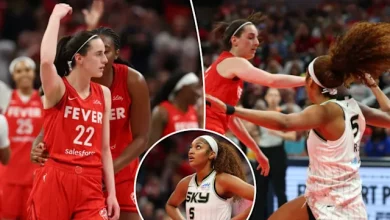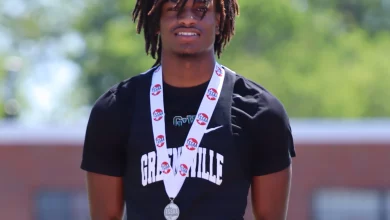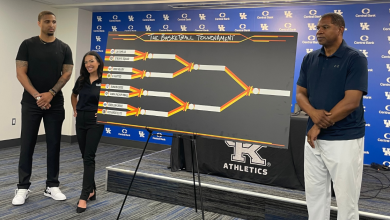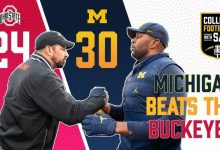Tennessee Basketball’s Zakai Zeigler Files Lawsuit Seeking Fifth Year of Eligibility: A Legal Battle for His Future
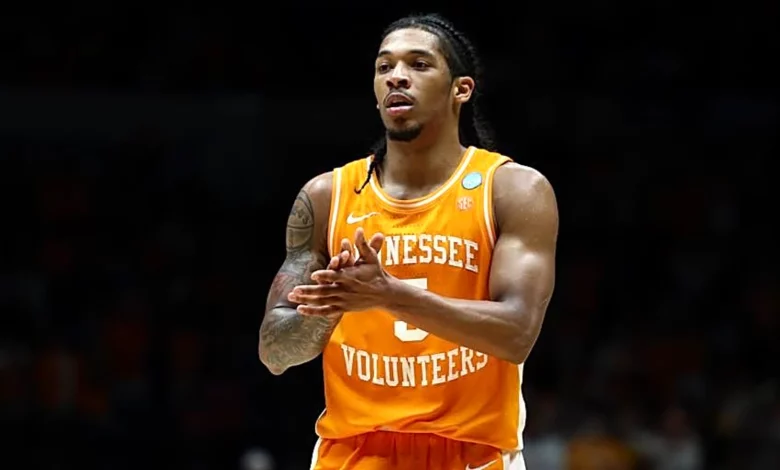
Zakai Zeigler, the dynamic point guard for the Tennessee Volunteers, has found himself in the midst of a legal battle that could shape the trajectory of his basketball career. The 2023-2024 season was poised to be a defining one for Zeigler, but an unexpected twist has forced the talented player to take a step that few athletes do: filing a lawsuit seeking a fifth year of eligibility. The legal battle for Zeigler’s future in college basketball has sparked widespread conversation, not only because of the stakes involved but because it brings attention to the evolving landscape of college athletics, the rules governing player eligibility, and the potential for future players to face similar challenges.
Zakai Zeigler’s College Basketball Journey
Zakai Zeigler’s path to college basketball stardom has been nothing short of impressive. Standing at 5’9″, Zeigler may not have the size typically associated with elite basketball players, but his quickness, vision, and tenacity have more than compensated for his physical limitations. A native of Long Island, New York, Zeigler initially gained attention for his outstanding performances at the high school level, where he exhibited a rare ability to control the game as a point guard. He had an innate knack for orchestrating his team’s offense, setting up teammates with precision, and showcasing a deep three-point shooting range that made him a threat from beyond the arc.
Zeigler’s talent didn’t go unnoticed, and he committed to play for the Tennessee Volunteers, a program with a rich basketball tradition. Under the guidance of head coach Rick Barnes, Zeigler quickly acclimated to the rigorous SEC competition and became a key player for the Vols. His ability to both score and distribute the ball made him an invaluable asset on the court, and he quickly earned recognition as one of the top point guards in the country.
Zeigler’s playmaking ability helped lead Tennessee to significant victories during his time with the team, and his leadership was integral to their success. However, despite his talents, Zeigler’s journey hasn’t been without adversity. During the 2023 season, a significant injury threatened to derail his plans for the future.
The Injury and the Impact on Zeigler’s Eligibility
In February 2023, just as Zeigler was finding his rhythm on the court and helping to drive Tennessee’s tournament aspirations, disaster struck. During a game against Arkansas, Zeigler suffered a torn ACL in his left knee, an injury that would force him to miss the remainder of the season. The setback was devastating for the player, his team, and Vols fans, as Zeigler had been playing at an All-SEC level and was expected to play a crucial role in Tennessee’s NCAA Tournament hopes.
While ACL injuries have become somewhat routine in professional and collegiate sports, they are still among the most difficult setbacks for an athlete to recover from. Zeigler’s rehabilitation process was long and grueling, but he remained determined to return to the court and finish his college career on his terms. Despite the injury, there was optimism that Zeigler would be granted a medical redshirt year, allowing him to extend his eligibility and return for another season.
However, this optimism quickly turned to frustration when the NCAA’s eligibility committee made a decision that would significantly impact Zeigler’s future: he was not granted the medical redshirt year. This ruling would effectively end Zeigler’s eligibility to play college basketball, leaving him with the difficult decision of either entering the NBA Draft or seeking alternative avenues to continue his basketball career.
The Lawsuit: A Battle for His Future
Faced with the possibility of his college basketball career coming to an abrupt end, Zeigler decided to take drastic action: he filed a lawsuit seeking a fifth year of eligibility. The lawsuit claims that the NCAA’s denial of a medical redshirt for his injury is unfair and inconsistent with the policies the NCAA has set for other athletes in similar situations. According to Zeigler and his legal team, the NCAA’s decision to not grant the medical redshirt contradicts the governing body’s prior rulings and sets a troubling precedent for future athletes.
The lawsuit is based on the argument that Zeigler’s injury should be classified as a legitimate reason to extend his eligibility by a year. Given that Zeigler had already played more than half of the 2023 season before the injury occurred, his legal team argues that the ruling is unjust, especially considering that the NCAA had previously granted medical redshirts for players who suffered injuries later in the season. The lawsuit also raises concerns about the inconsistency of NCAA policies, highlighting the fact that other players in similar situations had been granted extensions to their eligibility.
Legal battles involving college athletics and eligibility are not uncommon, but they are often complex and contentious. The NCAA’s rules on redshirt eligibility and medical exemptions have long been a point of contention, with many athletes, coaches, and fans questioning the fairness of the system. Zeigler’s lawsuit shines a light on the challenges that athletes face when dealing with the NCAA’s bureaucratic processes, and it raises questions about whether the system needs to be reformed to better accommodate athletes in situations like Zeigler’s.
Why This Lawsuit Matters: The Broader Implications for College Athletics
Zakai Zeigler’s lawsuit is not just a fight for his own future; it is part of a broader conversation about the rights and protections of college athletes. In recent years, there has been growing awareness of the challenges that student-athletes face when it comes to eligibility, injuries, and the NCAA’s governance. The NCAA’s decision to block Zeigler’s eligibility extension is emblematic of the organization’s often rigid and inconsistent approach to the rules that govern college athletics.
One of the key issues raised by this lawsuit is the NCAA’s eligibility rules, which some critics argue are too restrictive and fail to account for the realities that many college athletes face. Injuries like the one Zeigler sustained are common in sports, and yet, the NCAA’s eligibility rules are not always flexible enough to accommodate players who suffer serious setbacks. Athletes who miss significant portions of the season due to injury often find themselves in limbo, with their eligibility and futures uncertain.
The NCAA’s current policies on eligibility were designed to create a level playing field among student-athletes, but in practice, they often create obstacles for athletes who need more time to recover from injuries. While the NCAA’s rules allow for some flexibility, as seen with redshirt seasons and the COVID-19-related eligibility extensions, they are often applied inconsistently across the board. This can create confusion and frustration among athletes, as well as legal battles like the one Zeigler is now engaged in.
Zakai Zeigler’s case has the potential to be a landmark moment in the fight for fairer treatment of college athletes. If Zeigler wins his lawsuit and is granted the fifth year of eligibility, it could set a precedent that will influence how future medical redshirt cases are handled. It may also push the NCAA to reconsider its eligibility policies and adopt more athlete-friendly guidelines that take into account the unpredictable nature of injuries in college sports.
Zeigler’s Potential and the Impact of His Lawsuit on His Career
While the legal battle continues, Zeigler remains focused on his future in basketball. He has proven to be a resilient athlete throughout his college career, and his determination to continue playing speaks to his love for the game and his desire to make the most of his potential. If Zeigler is ultimately granted his fifth year of eligibility, he would have the opportunity to return to Tennessee for one more season, potentially solidifying his place as one of the top point guards in the nation.
Zeigler’s performance in his final season could have a significant impact on his professional basketball prospects. Despite his injury, he remains an intriguing prospect for NBA teams, particularly due to his leadership, defensive ability, and playmaking skills. Should he return for another year, he will have the chance to improve his draft stock, recover from his injury, and demonstrate that he is capable of performing at a high level.
If the lawsuit doesn’t go in Zeigler’s favor, he will be left with the decision to either enter the NBA Draft or explore other professional basketball opportunities. While the draft is an option, the uncertainty surrounding his recovery from the ACL injury could impact his position in the draft, forcing him to consider whether returning for another year of college basketball is the right decision for his future.
Zakai Zeigler’s lawsuit is about more than just one player’s eligibility—it represents a larger fight for fairness and consistency in college athletics. As the case moves forward, it will be important to follow its developments closely, as the outcome could have far-reaching implications for future student-athletes navigating the complexities of eligibility, injuries, and NCAA rules.
For Zeigler, the legal battle is a crucial step toward securing the future he envisions for himself in college basketball. His determination, both on and off the court, has already made him an inspiring figure in the college basketball community. Regardless of the outcome of his lawsuit, Zakai Zeigler’s legacy as a fierce competitor and a leader will endure. However, the result of this lawsuit could help shape the way future athletes are treated by the NCAA, making it a case worth watching for years to come.



